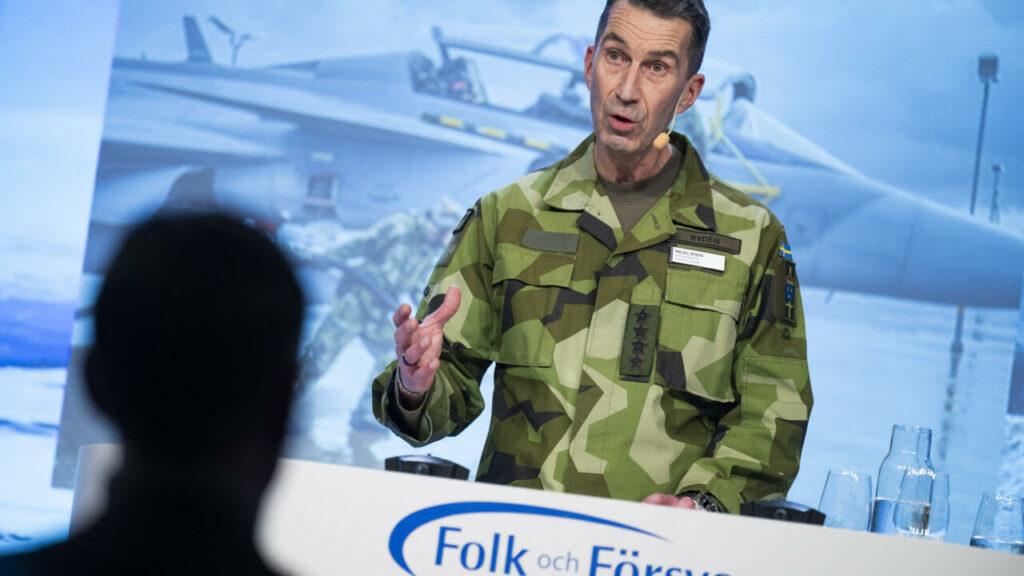The information booklet ‘If crisis or war comes’ was issued for the first time during World War II. After Russia’s annexation of Crimea it was revived again. © Thomas Henrikson, Handout MSB
The booklet was first issued during World War II and was distributed to all Swedish households in waves throughout the Cold War until 1961. In 2018, it was revised and re-issued again on the back of Russia’s 2014 annexation of Crimea.
“[The illegal annexation] was an awakening for the Swedish preparedness system,” Bohman explained. “All of a sudden the global situation changed, meaning we went from focusing only on peacetime crises to also include total defence planning in a bid to strengthen our total defence system. And a part of that was to ensure that we have a well-informed and prepared population.”
In 2022, when Russia launched its full-scale invasion of Ukraine, the booklet was sent out again. It contains information on how to prepare for and act in a crisis situation, ranging from everything from power cuts and forest fires to cyber attacks and war.
At the same time, MSB also encouraged Swedes to prepare “crisis kits” at home, containing necessities like a radio, food, water, a sleeping bag and a camping stove.
The booklet contains information on how to prepare for a crisis, including war. © Thomas Henrikson, Handout MSB
Some companies have since capitalised on this new “crisis kit” market, offering ready-made food kits that can last up to 25 years.
Multiple arrests, cyber-attacks and GPS-jamming
Since 2022, and in particular after Sweden defied Russian threats and launched a bid to join the NATO military alliance, the situation in the country has grown more and more tense. Prior to its NATO application, Sweden had not been aligned militarily for 200 years. Neither Turkey nor Hungary have green-lit the application yet, but the Turkish decision is now only a parliament vote away.
In the past year alone, Swedish police have arrested several people suspected of spying or carrying out information-gathering for Russia. Swedish authorities have also seen a surge in cyber-attacks, and in December, a large area over the Baltic Sea was subject to a number of GPS-jamming incidents, causing several airplanes to lose their satellite-derived navigation signals. In the same period, Russia carried out a military exercise in the area with the aim of “undermining enemy navigation and radio communications”.
“Some threats have intensified, [as has] the pure military threat, the threat of an armed attack, and the fact that we might be drawn into an escalation of the war in Ukraine. We’re seeing that very clearly when we study Russia,” Thomas Nilsson, the head of Sweden’s military intelligence and security service MUST told Swedish Radio in an interview on the sidelines of the security conference.
The TikTok backlash
But although last week’s comments may have been intended to place the Swedes on guard more than anything else, they also generated many negative reactions. Especially after making it onto the social media platform TikTok, whose main audience largely consists of children and teenagers.
“My children saw the TikTok and asked us about it,” said one Swedish mother of two who did not want to be named. “It’s hard for kids to focus and watch full clips, so what they basically see is just the headline: “War could come to Sweden”.
The child of one of her colleagues had seen the clip and come home in tears, she said.
Swedish child protection group BRIS said its hotline had been saturated with calls from worried children after the blunt comments on war had spread online, prompting its secretary general Magnus Jagerskog to plead with media to take more care in how they relay news to children.
“For many children who are easily anxious or who are already worried about war, it became [even more] difficult when they were faced with social media posts and adults talking on the news about war,” he wrote in a statement.
But the comments have also resulted in a political backlash. While the right-wing government has been accused of trying to win over supporters from the far right, the army has been accused of fear-mongering in a bid to up the annual defence spending budget.
“Playing with the threat of war as part of the political opinion campaign is immoral but who is surprised?” Carl Tham, a former minister and a member of the Social Democrat opposition, wrote in an opinion piece in daily tabloid Aftonbladet.
Prime Minister Ulf Kristersson, whose right-wing party is in a government coalition with the far-right Sweden Democrat party, has defended the hardened war rhetoric.
“A government should of course speak clearly, anything else would be irresponsible,” he told Radio Sweden in an interview on Thursday, but noted that “there is nothing that suggests that war is at the door”.
Source link : https://www.france24.com/en/europe/20240118-sweden-s-call-for-population-to-prepare-for-war-sparks-panic-and-criticism
Author :
Publish date : 2024-01-18 08:00:00
Copyright for syndicated content belongs to the linked Source.
